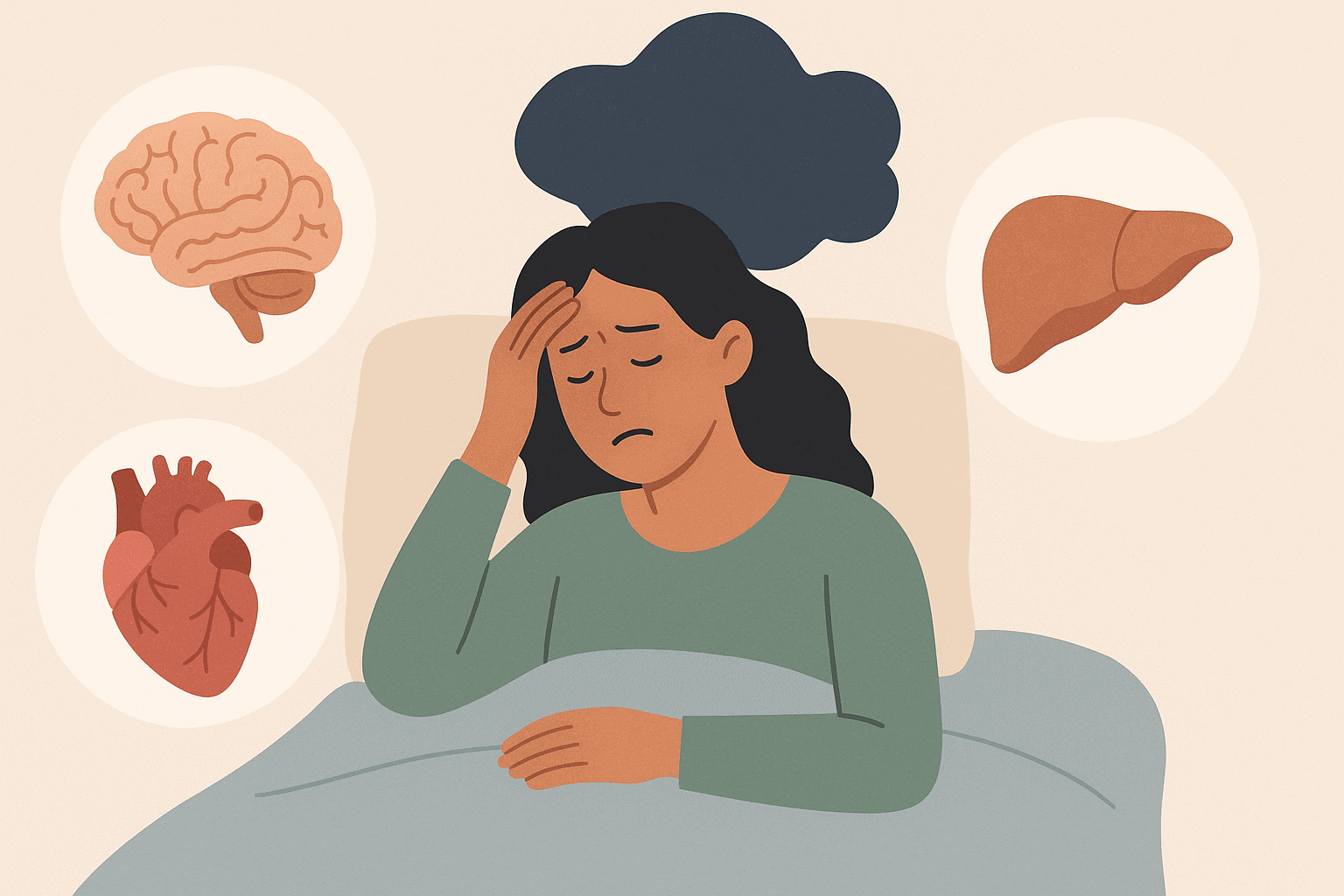The Effects of Chronic Insomnia on the Body's Major Organs
Sleep is more than a nightly rest — it's a biological necessity that allows every organ in the body to recover and repair. When sleep is repeatedly disrupted or insufficient, the consequences extend far beyond tired eyes or daytime fatigue. Over months or years, chronic insomnia can set off a cascade of physiological changes that compromise multiple organ systems — from the brain and heart to the liver and kidneys.
What Is Chronic Insomnia?
Chronic insomnia is defined as difficulty falling asleep or staying asleep for at least three nights per week, lasting for three months or longer. According to the National Institutes of Health, approximately 10–15% of adults suffer from chronic insomnia, and many more experience recurring sleep disturbances that fall short of a full diagnosis.
While occasional sleeplessness is usually benign, persistent sleep loss alters the body's neurochemical balance, elevates stress hormones, and triggers inflammatory processes that damage vital organs over time.
1. The Brain: Cognitive and Emotional Decline
The brain is the first to suffer from long-term insomnia. During deep sleep, neurons clear waste proteins through the glymphatic system — a process similar to the body's detox cycle. When sleep is fragmented, this cleaning system falters, allowing toxic proteins like beta-amyloid to accumulate.
Studies have linked this to an increased risk of memory decline, Alzheimer's disease, and mood disorders such as depression and anxiety.
Moreover, chronic insomnia impairs the prefrontal cortex — the area responsible for judgment and emotional regulation — while overactivating the amygdala, which governs fear and stress responses. The result is a hyperreactive brain that struggles to focus, remember, and stay emotionally balanced.
2. The Heart: Overworked and Under-Rested
One of the most alarming consequences of chronic insomnia is its impact on cardiovascular health.
Insufficient sleep increases levels of cortisol and adrenaline, keeping the body in a perpetual state of "fight or flight." Over time, this leads to higher blood pressure, endothelial inflammation, and disrupted lipid metabolism.
Research from the European Heart Journal found that individuals who sleep less than six hours per night have a 20–30% higher risk of heart attack and stroke compared with those who sleep seven to eight hours.
In essence, poor sleep robs the heart of the rest it needs to maintain rhythmic stability and vascular repair.
3. The Liver: A Hidden Victim of Nightly Wakefulness
Few realize that the liver follows its own circadian rhythm — processing fats, sugars, and toxins most efficiently during nighttime rest. Chronic insomnia or late-night activity disturbs this rhythm, reducing the liver's ability to metabolize nutrients and clear waste.
Over time, disrupted liver function can contribute to metabolic syndrome, fatty liver disease, and insulin resistance. A 2023 study in Frontiers in Endocrinology observed that individuals with chronic sleep restriction showed elevated levels of liver enzymes, indicating early signs of hepatic stress even in otherwise healthy adults.
4. The Kidneys: Silent Casualties of Sleep Deprivation
The kidneys, which regulate fluid balance and blood filtration, rely on sleep to control hormones such as renin and aldosterone. Insomnia disrupts these hormonal cycles, impairing the kidneys' ability to maintain electrolyte stability.
Long-term studies suggest that sleep deprivation increases the risk of chronic kidney disease (CKD), especially in individuals with hypertension or diabetes.
Moreover, poor sleep quality heightens oxidative stress and systemic inflammation — both of which accelerate renal aging.
5. The Immune and Endocrine Systems: Weakened Defense
When sleep falters, so does immunity. Cytokine production — vital for fighting infection — primarily occurs during deep sleep. People with chronic insomnia often exhibit reduced immune response, making them more prone to infections and slower recovery times.
At the same time, disrupted sleep interferes with hormonal balance, lowering growth hormone levels and elevating cortisol, which further suppresses immune and metabolic functions.
Protecting Your Organs Through Better Sleep
The encouraging news is that much of this damage is reversible once healthy sleep patterns are restored. Here are practical steps backed by sleep research:
- Maintain a consistent sleep schedule — even on weekends.
- Reduce exposure to blue light one hour before bedtime.
- Limit caffeine and alcohol intake after mid-afternoon.
- Keep the bedroom cool, dark, and quiet to promote deep sleep.
- Consider relaxation techniques such as breathing exercises or sound therapy — tools often integrated into apps like SnailSleep.
Even modest improvements in sleep duration and quality can markedly lower risks for cardiovascular and metabolic diseases.
Final Thoughts
Chronic insomnia is not simply an inconvenience — it's a full-body stressor with wide-ranging consequences. By recognizing its impact on the brain, heart, liver, kidneys, and immune system, we can treat sleep not as a luxury but as a vital sign of health.
Making sleep a nightly priority may be the most powerful medicine your organs ever receive.
References
- National Institutes of Health. "Insomnia: What It Is, Causes, Symptoms & Treatment."
- European Heart Journal, 2021. "Sleep Duration and Risk of Cardiovascular Events."
- Frontiers in Endocrinology, 2023. "Impact of Chronic Sleep Restriction on Liver Function."
- Sleep Foundation. "The Science of Sleep and Your Health."
- American Journal of Kidney Diseases. "Sleep Quality and Chronic Kidney Disease Risk." (2024)
Related Articles
- Sleep Deprivation and Kidney Health: How Poor Sleep Accelerates Renal Function Decline
- Pre-Sleep Habits That Seriously Affect Sleep Quality
- Insomnia and Snoring: Can Poor Sleep Quality Worsen Airway Obstruction?

